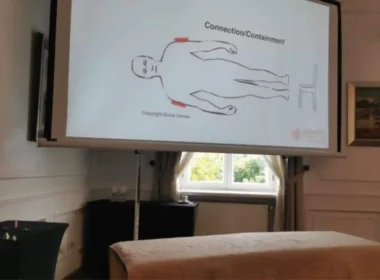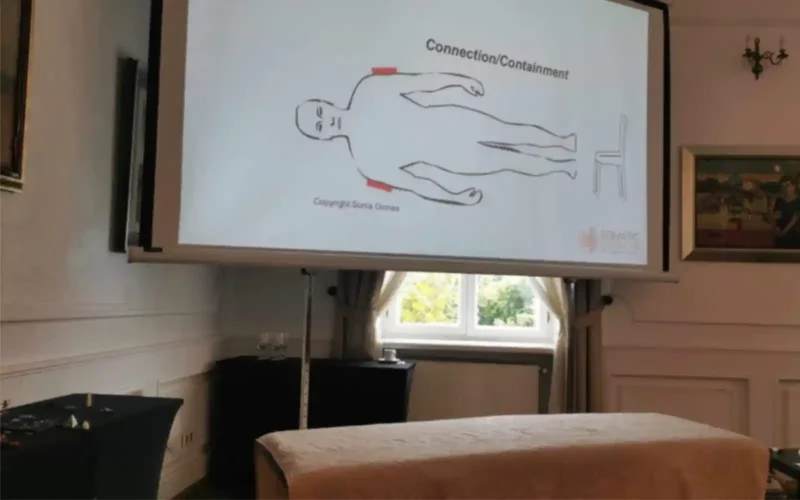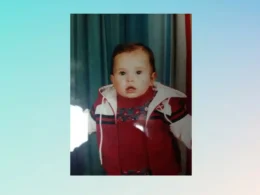Going to Dariusz Bugalski. K3 – a podcast about a good life I had a dream that our conversation would be as useful as possible for everyone.
And that’s exactly what we came up with – universal, reflective and giving very specific tips to be implemented immediately. There is both a meta level and a very practical level. It is about relationships, about the nervous system and the body, about mindfulness, about self-regulation and co-regulation. About dialogue with the body, about wounded healers, about internal fragmentation and regaining coherence. About sexual trauma and any trauma provoked by humans. About healing and growing after trauma. About great books about sexual trauma therapy.
Thank you for the invitation, Mr. Dariusz. It was an enormous pleasure! And an honor.
And with emotion, I present to you these 55 minutes of a conversation that has a chance to do a lot of good in your life. You can find the conversation here.
PS Below you will find some thoughts from the conversation.
“Trauma is overwhelm. Automatically, when we encounter something like this, our nervous system switches from the mode of being freely in the world, of exploration, to the mode of survival. And this survival has its own sequence, such a structure, so that I can save myself if something has overwhelmed me so extremely , there must be some part of me that will protect the overwhelmed me. And the essence of trauma is this fragmentation, that there is a wounded, delicate part of me – traumas can be of different types, so these wounds are of different types – but there is also another part. , who takes the lead and she begins to be my bodyguard, a guard who will do everything to ensure that what I experienced will never happen to me again.”
“All reactions that appear after trauma are a manifestation of health. That is, a manifestation of the fact that our nervous system responded in an adaptive way to a given moment and saving our lives. But what matters more to the nervous system is that we survive than that we They continued to live in well-being, so sometimes these consequences of trauma are more burdensome and disruptive to our lives than the trauma itself.”
“I’m suffering and it’s my fault” is the essence of trauma. Trauma is often something to which we are unable to give meaning, or rather, we are unable to find meaning in what happened. Because what happened goes beyond how we think about the world, about ourselves, about others. I didn’t do this to myself, someone else did this to me. This shouldn’t have happened at all. But this feeling of guilt is often the only way to make sense of what happened at a given moment. It makes so much sense, it’s so chaotic, that my mind begins to try to protect me in such a strange and very difficult – and long-term toxic – way that it says, “OK, the only sense I can make of this is that it’s your own fault.”<
“It is said about trauma that it is the most effective way of learning. This means that if something traumatic has happened to us, we have almost a bank that our nervous system will never forget it. It will always keep it, although we will not always react in the same way as we learned after the trauma. If we are lucky, if we take care of this recovery. If I take care of them, they can gain a past.
“The body always tells its truth, which is not always the truth of other layers of our functioning and perception. We use the metaphor of a relationship with a small child to refer to this relationship with the body […]. Our body always reacts according to its internal truth, but it is not always something that is true in the space of facts. The body has its own truth, the body has its own memory and, above all, the body only uses words to regulate it to a limited extent. The language for regulating the body is not talking to it, but primarily a tool for calming down the agitated body or waking up, cut off from body sensation, is movement and touch. These are different sensory experiences.
“Treating the body well means, paradoxically, not only giving it pleasure. Giving it the opportunity to be in various forms, that is, as lightness, pleasure, tenderness as possible, so that it goes to bed earlier, that I surround this body with people it likes, and not what my ego, my ambition likes. But also allowing the body to come into contact with what the body doesn’t like in such a gentle, gradual way, and it has learned to avoid it automatically.
“Trauma needs the once blocked reactions to what happened to me to end. For them to go further in time. So, for example, if I couldn’t scream during a terrible interpersonal situation, working with the trauma will consist in finishing that scream, even though it doesn’t necessarily have to be a scream. I can activate the feeling in my throat, vocalize something, make some sound, I will use my voice. This is the ending […]. There are situations when it is healing it heals us. And the body, or perhaps the memory, doesn’t have to keep coming back to this situation and reminding: “It’s not closed.”















